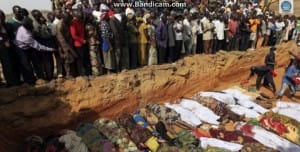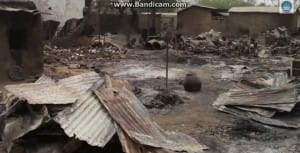
From a bombed NAACP office in Colorado to the decimated town of Baga, Nigeria, acts of terrorism against Black people and institutions have failed to generate much attention in the United States this past week.
Most of the Western world and its political leaders have, instead, turned their eyes to No. 10 rue Nicolas-Appert, Paris, France – the location of satirical magazine Charlie Hebdo. As most of the world now knows, an al-Qaida-led terrorist attack left 12 people dead there last Wednesday. And in a separate, related terrorist attack on Friday in Paris, four hostages were killed by a gunman at a kosher supermarket.
Following in the footsteps of civil rights marchers in the United States on Sunday, world leaders, such as Israel’s Prime Minister Benjamin Netanyahu and Gabon’s President Ali Bongo Ondimba, linked arms in unity and led an estimated 3.7 million people in a march to show solidarity with Charlie – a magazine whose Islamophobic bent has been largely underplayed in a broader debate about free speech.
The hypocrisy of certain world leaders attending the march, while maintaining a vise grip on free speech in their own countries, has been well documented. But the relative silence surrounding the horrific, nearly contemporaneous attack that took place in Baga has been deafening.
In Baga and the surrounding area, it’s estimated that 2,000 people were killed last week – mostly the elderly, women and children – when Boko Haram, the same terrorist organization responsible for kidnapping more than 200 schoolgirls last April, methodically massacred them and set the town on fire. And this weekend, Boko Haram also used three 10-year-old girls to blow up markets in the towns of Potiskum and Maiduguri, leaving more than 20 people dead.
“This marks a disturbing and bloody escalation of Boko Haram’s ongoing onslaught,” said Amnesty International’s Daniel Eyre several days after the bloody attacks.
Yet the silence continues.
The hypocrisy of certain world leaders attending the march, while maintaining a vise grip on free speech in their own countries, has been well documented. But the relative silence surrounding the horrific, nearly contemporaneous attack that took place in Baga has been deafening.
It’s almost willful at this point, this blatant disregard and unconcern for Black lives, both here and throughout the Diaspora. After months of social and racial unrest sparked by the state-sanctioned killings of unarmed African Americans across the country, so-called liberal allies had a chance to proclaim that “Black Lives Matter” at the Golden Globe Awards on Sunday. Instead, Hollywood heavyweights from George Clooney to Kathy Bates proclaimed, “Je suis Charlie,” choosing instead to show solidarity with a wildly offensive satirical magazine halfway across the world.
Hip-hop artist, actor and activist Common was the only person who even made mention of simmering protests around the country. But even still, his remarks were framed as “all lives matter,” when the loud silence on Black deaths both in America and abroad shows the very opposite to be true.
At the same time that Black and Brown victims around the world are made invisible, we simultaneously see a perpetuation of the myth of Black and Brown criminality: Fox News correspondent Shannon Bream claimed after the Charlie Hebdo attacks that it’s difficult to tell who the “bad guys” are if you “can’t see what color they are.”

Not surprisingly, Lassana Bathily, the Black Muslim who saved the lives of several shoppers when Amedy Coulibaly burst into Parisian kosher market Hyper Cacher, was not hailed as the hero he is; in fact, he was initially considered a suspect because of his skin color.
“They told me, ‘Get down on the ground, hands over your head,’” he told BFMTV. “They cuffed me and held me for an hour and a half, as if I was with them.”
Sounds familiar, doesn’t it?
In describing Cherif Kouachi, who, along with his brother, Said Kouachi – both now dead – is accused of carrying out the Charlie Hebdo attacks, the Washington Post had this to say about him and his neighborhood: “ (R)adical Islam simmered in the 19th arrondissement. Its skyline was crowded with the sort of high-rises the Associated Press described as ‘public housing slums that breed violence and crime.’ … He drank, smoked pot, slept with his girlfriend and delivered pizzas for a living … and spent a lot of time listening to rap music.”
The suggestion that, apparently, rap music is somehow partly to blame for the Charlie Hebdo attacks has been floating throughout the mainstream media narrative, with video surfacing on YouTube of Kouachi rapping. It’s ludicrous.
There has been an almost instinctive need to contextualize these crimes through a white supremacist lens, raising the specter of Blackness as a terroristic threat to society. Meanwhile, the brutal killing of thousands of Nigerians largely goes ignored.
Whatever else is said, this I know for sure: While the world holds its arms out in sympathy for Charlie Hebdo, we who believe in freedom must seek justice for Black people around the world – including for the victims of Boko Haram. We must continue to say that all Black lives matter, even when the world refuses to see it.
We must continue to say that all Black lives matter, even when the world refuses to see it.
Kirsten West Savali is a cultural critic and senior writer for The Root, where this story first appeared and where she explores the intersections of race, gender, politics and pop culture. Follow her on Twitter.
http://youtu.be/73Ex6tYE3eo





